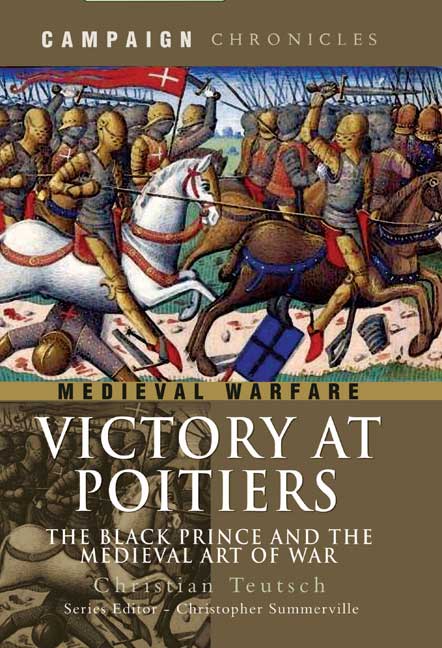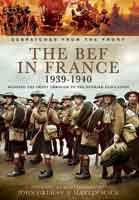Victory at Poitiers (Paperback)
The Black Prince and the Medieval Art of War
Imprint: Pen & Sword Military
Series: Campaign Chronicles
Pages: 176
ISBN: 9781844159321
Published: 24th March 2010
(click here for international delivery rates)
Need a currency converter? Check XE.com for live rates
| Other formats available | Price |
|---|---|
| Victory at Poitiers ePub (3.1 MB) Add to Basket | £6.99 |
On 13 September 1356 near Poitiers in western France, the small English army of Edward, the Black Prince crushed the forces of the French King Jean II in one of the most famous battles of the Hundred Years' War. Over the centuries the story of this against-the-odds English victory has, along with Crécy and Agincourt, become part of the legend of medieval warfare. And yet in recent times this classic battle has received less attention than the other celebrated battles of the period. The time is ripe for a reassessment, and this is the aim of Christian Teutsch's thought-provoking new account.
Christian Teutsch is a military history instructor at the United States Military Academy at West Point, and he has served in the US Army Infantry in combat tours in Afghanistan and Iraq. He has an MA in medieval history and has made a special study of English warfare during the thirteenth and fourteenth centuries. In addition to his work on the Poitiers campaign, he has written about Edward I's military education during the Baron's War.
Teutsch describes in vivid detail the Black Prince's experiences that led to his horse charge across the countryside of southwest France, and the critical actions of Romorantin and Chatellerault that made Poitiers possible. His narrative culminates with the prince's daring ride to draw the French king Jean into battle and the drama of the combat itself. Combined with a selection of over 15 battlefield maps showing the orders of battle, this informative and highly readable account is a compulsive purchase for all with an interest in medieval history.
The Lance and Longbow Society
If Christian Teutsch’s Victory at Poitiers contributes anything new to the study of this critical battle of the Hundred Years’ War, it is the insight that the author—a combat veteran, West Point graduate and instructor, and career military officer—brings to the subject from his own lived experience. Though an extremely entertaining writer with a good grasp of the subject, Teutsch is not a professional academic: A Western Civ-style introduction, including a somewhat muddled and irrelevant account of the Pirenne Thesis, forms the first few pages, and he makes use of some rather amusing nineteenth-century translations. But then, Teutsch doesn’t need to be a world-class scholar to accomplish his objective: The influence of Cliff Rogers can be clearly seen, and this volume serves not only as an in-depth treatment of the battle itself, but as a sort of textbook distillation of the most recent and best thinking on the Hundred Years War. For instance, the aim of chevauchée, for Teutsch (as for Professor Rogers) is economic warfare and to force a decisive battle, by means of which the English, with fewer strategic resources but the tactical advantage of choosing the battlefield, could triumph.
Ken Mondschein- deremilitari.org
Indeed, the bulk of the book is devoted to context, exploring what Professor Rogers has called the “Military Revolutions of the Hundred Years’ War”. After brief and rather general primers on medieval warfare and the political situation, two lengthy chapters are devoted to Crécy and Neville’s Cross , which drive home the main points on the usefulness of forcing battle, the advantage of tactical position, the skilful use of dismounted troops, and battle as the “final arbiter.” All of these would make themselves felt in the Black Prince’s strategy at Poitiers. (On the other hand, Teutsch is more sanguine about the longbow than Professor Rogers, or at least has less ground to deploy this argument: Poitiers, as the chronicles confirm, was won by the English choice of ground and bloody hand-to-hand combat.)
Teutsch covers the period between Crécy and 1355 in a chapter of some six pages, and then devotes ten to the campaign that led to the battle: In the summer of 1356, Edward the Black Prince and his Gascon allies launched a great chevauchée across southwestern France. The French king, Jean II, was shamed into pursuing him, finally catching up in mid-September near Poitiers. This seems somewhat scant in comparison to the rich detail in the chapters on Crécy and Neville’s Cross , and could have used some more fleshing out.
The seventh chapter, the longest at fifty pages, covers the battle itself. The Black Prince chose his battlefield well: His 6,000 dismounted troops, organized in two or three groups, had their back to a small forest, the Woods of Noauaille; on his left was the Maisson River and the Wood of St. Pierre, while on his right was his plunder-laden baggage train, parked on the Roman road between Bourdeaux and Poitiers. His army commanded the high ground and was hidden by hedges, concealed in the woods at his back was a reserve troop of mounted knights, and each flank was secured by a group of 500 archers armed with the deadly English longbow. The story is well familiar to students of medieval military history, but it is worth mentioning that Teutsch pays attention to the terrain and orientation of the battlefield, weighing the commanders’ preliminary actions as only a career military officer can and adding a unique perspective to what would otherwise be a forced slog through ground churned to mud under the boot prints of legions of other writers.
Teutsch also pays more attention to the role of diplomacy than most popular accounts, adding how the attempts of a papal legate to negotiate a peace on Sunday, 18 September spoke to the Black Prince’s shrewdness as a commander. Unsurprisingly, negotiations broke down and the commanders faced one another across the field on the morning of Monday the nineteenth. The first contact with the enemy was the English longbowmen on the right flank showing themselves. This drew a cavalry charge from the French commander Cleremont. Mindful of the disaster at Crécy, where the English archers carried the day, the longbowmen were the primary French target. However, Cleremont led his men into an ambush: Though invulnerable from the front, they were met by withering flanking arrow fire.
Since, dismounted, the French knights were essentially arrow-proof thanks to their armor and the English were running low on ammunition in any case, this was to be a battle of footmen. Three groups under the Duke of Orleans, the Dauphin Charles (later King Charles V), and his brothers closed with the English. King John remained in the rear with his 400 mounted knights. The English archers joined in to fight hand-to-hand.
As Teutsch points out, accounts differ on what happened next, but what seems to have occurred was a failure of morale on the part of the French: The Dauphin’s men drew back to regroup and Orleans’ men, seeing this, took flight. The remaining troops rallied around King Jean—a sizable, fresh force well able to smash the now-weary English. However, a cavalry charge from the English reserves, commanded by Jean de Grailly, a Gascon nobleman, smashed the French center. King Jean, fighting valiantly on foot, was captured, and the English won the field with minimal casualties. French casualties, however, numbered 2,500, with 2,000 taken prisoner—including, besides the king, 35 major noblemen and more than 100 knights.
The aftermath of the battle was also important, and not neglected by the author. This last chapter covers some fourteen pages. The French were disorganized, demoralized, and forced into a series of humiliating treaties. King Jean’s ransom was twice the yearly income of the entire country; he was unable to raise it, left the kingdom in the hands of the dauphin (the future Charles V), and returned to English custody to live a life of indolent captivity and finally die in 1364. The French peasantry, oppressed by the need to pay a literal king’s ransom and saddled with taxes by a nobility that had proven itself incapable of defending their lands, rose in rebellion in 1358. The French would not risk another set-piece battle for half a century.
Teutsch’s strengths are a fairly good grasp of the secondary literature and a professional understanding of military tactics, formations, and strategy, as displayed in his many diagrams and evidenced by his calm expertise in the weighing of differing historical accounts. Lest one think that this is all a kriegspiel, he also efficiently evokes the blood and mud and terror of combat. His weaknesses are in his occasional over-reliance on the secondary sources (though, alas, not Steve Muhlberger’s recent works, which do much to evoke the fourteenth-century chivalric mindset) and Victorian translations that read like Sir Walter Scott. As the Anglocentric title indicates, this is also a story very much told from the English point of view—though in a book of this sort, this is perhaps to be expected.
In all, this is a good primer of the Battle of Poitiers that I would recommend to an undergraduate or general reader interested in the subject. Teutsch understands that warfare does not take place in a political, social, economic, or logistical vacuum, and his sifting of the accounts, though hampered by the use of translations, benefits from his real-world expertise. Likewise, he brings his subject alive with prose that is by turns professional and passionate. I look forward to more, and more scholarly, titles from him.
Of the many battles of the Hundred Years' War, that of Poitiers (19 September 1356) is the least well-studied. Yet it brought the greatest political advantage for the English through the capture of the French king, John II, by Edward of Woodstock (better known as the Black Prince).
Anne Curry for BBC History Magazine
This book attempts to cover more than the battle itself. It owes much to the approaches of Professor Clifford Rogers, especially in the ideas that commanders had the capacity for strategic thought and also learned from previous experiences. Not suprisingly this leads to some discussion of the lessons of Crecy, Nevilles Cross and the campaigns of 1355. This is standard and rather limited stuff. Discussion of the 1356 campaign begins almost 70 pages into the book. Fifty pages are devoted to a day-by-day account of events from 16 to 20 September. This is when the book at last starts to come to life. There is interesting material on how the armies edged towards each other. This gives a good feel of increasing tension. The stages of the battle itself, and of the commanders and sub-commanders within it are nicely handled. Due attention is paid to the problems that the sources raise. The route of the flanking manoeuvre of the Captal de Buch has long been a matter of contention: Christian Teutsch reviews the possibilities and advances his own with close attention to the topographical features of the location. The book closes with a very perfunctory chapter on the aftermath of the battle which provides almost no detail other than that found in standard histories of the Hundred Years' War.
The result is a pleasant enough book but one which does little to advance our knowledge of the battle or of warfare in the period. To my mind, a fuller and longer discussion of the battle itself would have been more valuable, especially given the author's insights as a serving officer. The background does not seem wholly expert. The book uses some extracts from newsletters and chronicles as published by Rogers and Barber but that it should draw on the highly derivative chronicle of John Capgrave, written in the mid-1450s, is perplexing.
This is one of those books where the sub-title is more important than the title. Only two of the eight chapters actually look at the campaign and battle of Poitiers. We start with an introduction to Medieval Warfare, before Teutsch moves on to four chapters examining the progress of the Hundred Years War, and the lessons that the Black Prince might have learnt from the victories at Crecy and Neville's Cross as well as the less well known battles of war.
History of War Website
A major feature of Teutsch's account of the battle itself is his use of the sources, attempting to produce a coherent account of the fighting from often contradictory chronicles. The presence of sizable quotes from key sources helps the reader to decide how successful he has been.
The author has a military background, including a spell teaching at West Point. Some authors with this sort of background make the mistake of writing as if the subject of their work had a staff college education, but Teutsch has successfully avoided that error, remembering that the Black Prince lived in a very different world.
This is an interesting new account of the battle of Poitiers, and as such should be read alongside more established histories to put Teutsch's new ideas in context.




















